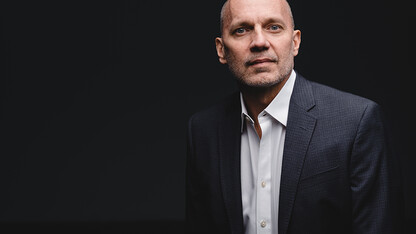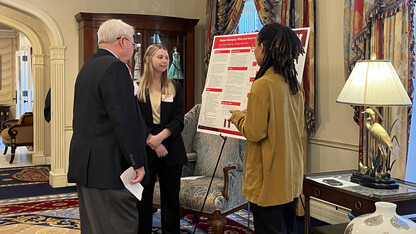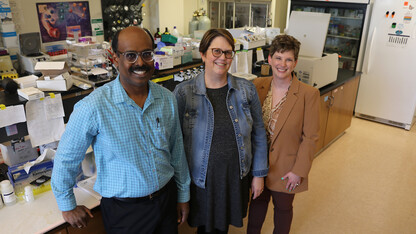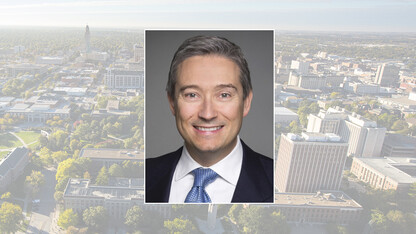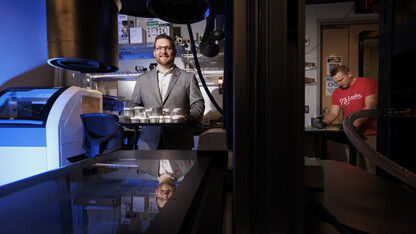· 11 min read
Nebraska in the national news: June 2020

Four University of Nebraska–Lincoln faculty members were interviewed for national news stories on the recent wave of Black Lives Matter protests and broader issues such as police brutality and systemic racism. The stories were among 50-plus featuring Husker faculty, staff, students, centers and programs in June.
- Deirdre Cooper Owens, Wilson Professor of History and director of the Humanities in Medicine program, was cited in a June 1 article in The Nation on whether the COVID-19 crisis might be a turning point in the fight against racial disparities in health care. She argues that racism meets the CDC’s criteria for declaring a public health threat: It puts a significant burden on society and disproportionately affects part of the population; current measures to address it are inadequate; and a coordinated, broad approach is necessary in response. She was also featured in a June 22 column by the Lincoln Journal Star’s Cindy Lange-Kubick on medical racism.
- Patrick Jones, associate professor of history and ethnic studies, and Cynthia Willis-Esqueda, associate professor of psychology, were interviewed for a June 7 Associated Press article on the George Floyd protests spreading to smaller, mostly white towns. Jones said the protests reflect long-simmering anger over implicit discrimination. Willis-Esqueda said social media has made it easier to publicize and organize rallies, while the pandemic has driven up unemployment and economic anxiety among minorities who were already struggling financially. The story was picked up by 250-plus media outlets. Willis-Esqueda was also interviewed for a June 11 Vox story on whether more white Americans talking about systemic racism and police brutality will translate into action. “Psychologically, people are upset; they’re motivated to take action,” she said. “My hope is that we create some kind of meaningful change.”
- Sergio Wals, associate professor of political science and ethnic studies, was interviewed for a June 10 USA Today article looking at data surrounding the recent Black Lives Matter protests. Nebraska may be mostly white, but it has one of the fastest-growing foreign-born populations, Wals said. Protests in Lincoln and other parts of the state may reflect growing diversity, he said, but many people were also moved by the brutality they saw in the video of Floyd being held down by officers. “Whomever watched those painful 8 minutes and 46 seconds, that’s just the trigger, that’s just the tipping point for a lot of people,” he said.
- Lory Dance, associate professor of sociology and ethnic studies; Kwakiutl Dreher, associate professor of English and ethnic studies; Jeannette Jones, associate professor of history and ethnic studies; and Patrick Jones were also interviewed for June stories on the topics in the Lincoln Journal Star (1, 2), NET News (1, 2) and Omaha World-Herald.
More coverage:
Colin Ramsay, finance, was quoted in a June 1 Atlantic column featuring experts offering advice to recent graduates. “Do not be risk-averse,” he said. “Gather as much information as you can — then take measured and calculated risks.” Ramsay also suggested that graduates create a short-term plan (one or two years), as well as a long-term plan.
Frans von der Dunk, space law, wrote a June 2 article on the Artemis Accords for the University of Auckland’s Big Q series. He wrote that most of the principles outlined in the accords echo or elaborate on provisions of the seminal 1967 Outer Space Treaty. However, some principles — such as protection of the Apollo landing sites and those of robotic lunar missions; “safety zones” around Artemis sites; and space mining and other resource utilization — raise complex issues.
Von der Dunk was also quoted in a June 15 Publimetro article on the commercialization of space. “Legally speaking, the moon, planets, asteroids and any other celestial bodies all belong to the same basket,” he said. “They are all part of the global commons of outer space and therefore not subject to national appropriation.”
Mazbahul Ahamad, postdoctoral researcher in agronomy and horticulture, wrote a June 2 guest column for The Business Standard on how inaccurate COVID-19 death reporting can harm ongoing public health efforts and limit access to aid and assistance now and in the future. He focused on underreporting in Bangladesh.
Ahamad also wrote a June 27 guest column for The Business Standard on the COVID-19 response in Bangladesh. “If government agencies continue to invest in less-prioritized health initiatives instead of emergency necessities, it will significantly undermine the ongoing COVID-19 response effort, and common people will suffer the most,” he wrote.
Amit Jhala, agronomy and horticulture, wrote a recent article on which residual herbicides to use on emerged corn. He wrote that growth stage, weed height and tank-mixes should be considered. Corn+Soybean Digest ran the article June 2.
The Nebraska Pork Producers Association and the university’s Department of Animal Science and Loeffel Meat Laboratory have begun an initiative to connect Nebraska pork producers with people in the state facing food insecurity. Through the Pork Cares campaign, the groups are helping pork producers donate pigs to Nebraska food bank programs. Stories on the initiative appeared in nine Nebraska media outlets, the High Plains Journal and National Hog Farmer.
Clint Krehbiel, animal science, discussed the initiative during a June 9 segment on RFD-TV.
Chigozie Obioma, assistant professor of English and acclaimed author, recently received an International Literature Award from Berlin’s House of World Cultures for his second novel, “An Orchestra of Minorities.” DW.com and several other media outlets published stories on the award winners.
“An Orchestra of Minorities” was included in a June 8 London Evening Standard list of fictional works by black authors to help people diversify their bookshelves. The article described the novel as a “deft reimagining of Homer’s ‘Odyssey’ with Nigerian Igbo traditions at its forefront.”
Obioma was also included in a June 25 Literary Hub article on writers’ favorite children’s books. He said the books that have stuck with him since childhood include “The Palm-Wine Drinkard” by Amos Tutuola; “Hamlet,” “Macbeth” and “Romeo and Juliet” by William Shakespeare; “Ogboju Ode Ninu Igbo Irunmale” by D.O. Fagunwa; and “The Sugar Girl” by Kola Onadipe.
Nebraska Athletics has teamed up with Opendorse to launch the Ready Now Program, a first-of-its-kind program designed to help student-athletes build their individual brands on social media. FiveThirtyEight highlighted the program in a June 8 article. Garrett Klassy, senior deputy athletic director for external operations at Nebraska, was interviewed for the story. Several Husker student-athletes — including football player Adrian Martinez and volleyball player Lexi Sun — were featured in the story.
Fadi Alsaleem, architectural engineering and construction, and colleagues believe that fever-related data from Kinsa thermometers is offering a much-needed empirical perspective on the effectiveness of social distancing — and could help preview the outcomes of relaxing such guidelines. Stories on the research appeared in eight Nebraska media outlets — including KLKN, KOLN/KGIN and the Omaha World-Herald — as well as Technology.org.
The College of Engineering’s Biological Process Development Facility is working with an emerging biotechnology company on a vaccine that could treat patients who have the novel coronavirus and help prevent similar outbreaks in the future. Stories on the research appeared in the McCook Gazette, Omaha Daily Record and Technology.org.
A new study co-authored by Jay Storz and Anthony Signore, both biological sciences, has traced the evolutionary history of hemoglobin, discovering that just two mutations helped transform the two-part architecture of a predecessor into the four-part form boasted by the modern protein. Technology.org ran a June 11 article on the research.
The economic impact of Husker football game days was highlighted in a June 14 Bloomberg Tax article. Each game brings in an impact of about $5.2 million to the Lincoln metropolitan area, according to Eric Thompson, economics, director of the university’s Bureau of Business Research.
Thompson was also interviewed for a June 19 CNN.com article on Nebraska’s low unemployment rate compared to other states. “We retain advantages … in the sense of having a larger share of our economy in sectors that weren’t as hard-hit” by the COVID-19 pandemic, he said. Primary industries in Nebraska include a large rail and trucking sector; farm equipment manufacturing; and insurance and financial services. Also, Nebraska’s lockdown measures weren’t as extensive as other states, Thompson said.
The university’s LGBTQA+ Center was highlighted in a June 15 article in Diverse: Issues in Higher Education. The center has developed resources to help students feel supported through changes brought on by the COVID-19 pandemic. Pat Tetreault, the center’s founding director, was interviewed for the story.
David Berkowitz, chemistry, was featured in Chemistry World’s “Chemists Amid Coronavirus” series on June 16. He recently began his appointment as director of the National Science Foundation’s Division of Chemistry. He also continues to conduct research at Nebraska.
Research by Janos Zempleni, molecular nutrition, and director of the Nebraska Center for the Prevention of Obesity Diseases, and colleagues was featured in a June 17 Scientific American article on whether microRNAs in food affect gene expression. The researchers are studying how milk exosomes carry microRNAs and the health impacts.
Doug Schultz, Center for Brain, Biology and Behavior; and Matt Johnson, psychology, recently participated in an international study showing that functional MRI analyses are far from black-and-white. Technology.org ran a June 17 article on the study.
Eduardo Mora, a freshman advertising and public relations major at Nebraska, organized a May 30 Black Lives Matter protest in Norfolk. He was interviewed for a June 19 Bloomberg CityLab article on BLM protests in suburbs and small towns.
Tala Awada, Agricultural Research Division, was interviewed for a June 19 Harvest Public Media story on the Long Term Agroecosystem Research network. She said the Platte River/High Plains Aquifer site of the network has several long-term data sets, with some going back to the 1970s, a few going back to the ’40s and one going back to the early 1900s. The story ran on Iowa Public Radio, among other outlets.
Forty-one recent high school graduates have been selected to join the latest cohort of the university’s Jeffrey S. Raikes School of Computer Science and Management. Stories on the students have appeared in the Chadron Record, Grand Island Independent, Scottsbluff Star-Herald and Arlington Heights (Illinois) Patch site.
Kelsy Burke, sociology, and Emily Kazyak, sociology, and women’s and gender studies, co-wrote a June 22 piece for The Conversation on the U.S. Supreme Court’s recent ruling putting LGBTQ rights and religious freedom on a collision course. They wrote that it will be up to the courts to decide whose claim to protection has the greater validity. More than 70 media outlets picked up the article.
Tony Award-winning composer, lyricist, producer and musical director/arranger Jason Michael Webb performed June 26 as part of the Lied Center for Performing Arts’ Lied Live Online concert series. Broadway World published a June 22 article on the performance.
The concert was also featured in a June 26 Time Out list of live theater events to stream online.
Terry Howell, executive director of the university’s Food Processing Center, discussed hand sanitizer production at the center during a June 23 segment on RFD-TV. The university has partnered with the Nebraska ethanol industry to produce more than 120,000 gallons of hand sanitizer since April.
James Schnable, agronomy and horticulture, and Yeyin Shi, biological systems engineering, are part of a research team developing a system that will constantly monitor fields at near single-plant resolution, predict productivity and help farmers manage their water and fertilizer use. Technology.org and a few other media outlets ran stories on the system.
Nebraska’s leading economic indicator rose 2.45% in May after sharp declines in March and April, according to the most recent report from the university’s Bureau of Business Research. The results were highlighted in USA Today’s 50 States feature on June 26.
Husker students Beth Hildebrant and Breanna Reynolds recently discussed their PGA WORKS scholarships on PGA.com’s Launch podcast.
Debra Hope, psychology, was interviewed for a June 27 New York Times article on managing anxiety as much of the United States reopens amid the COVID-19 pandemic. She recommended starting a journal to write down the things one misses most and that one gradually wants to reintroduce into one’s life, then assessing each activity and coming up with a plan for how to do it safely. She suggested viewing this time period as an opportunity to weigh whether one wants to continue past relationships and activities.
A new study co-authored by Philip Schwadel, sociology, and Brandi Woodell, assistant professor of sociology and criminal justice at Old Dominion University, found that emerging adults with same-sex attraction are twice as likely to disaffiliate from organized religion than their heterosexual peers, but there was little change in prayer. Stories on the research appeared in The Medical News, Phys.org, Science Codex and Scienmag.
Thomas Omer, accounting, co-authored a recent study showing that companies that dismiss their auditor-provided tax services out of concern for appearances end up paying more taxes by 1.64 percentage points. CFO Dive and CFO Magazine published articles on the study.
Faculty, administration, student and staff appearances in the national media are logged at http://newsroom.unl.edu/inthenews. If you have additions to this list, contact Sean Hagewood at shagewood2@unl.edu or 402-472-8514. If you have suggestions for national news stories, contact Leslie Reed at lreed5@unl.edu or 402-472-2059.


